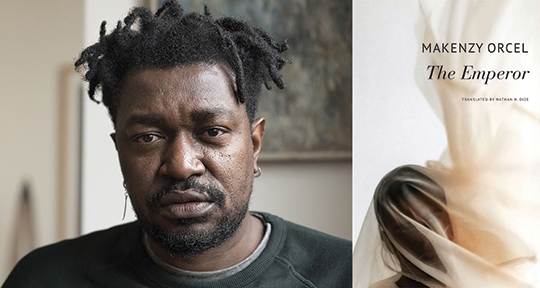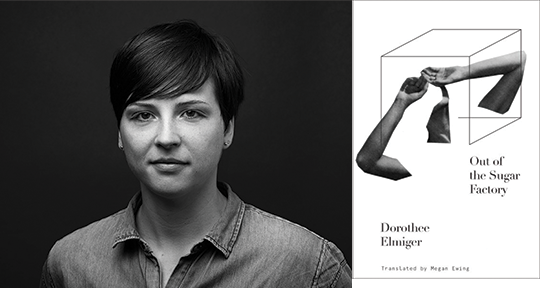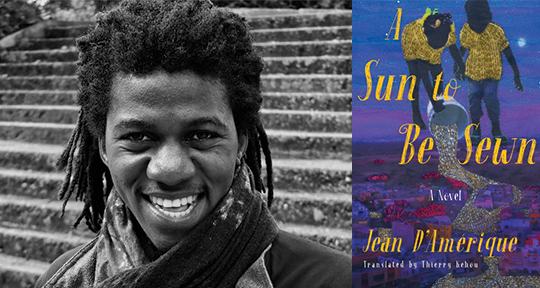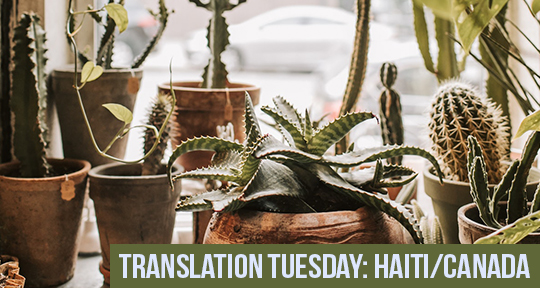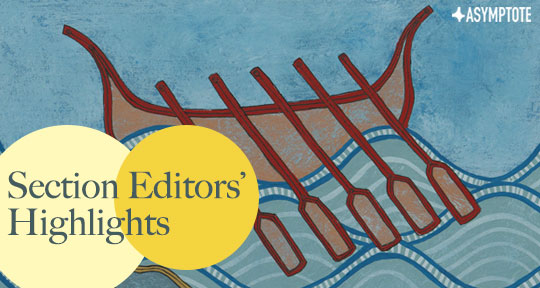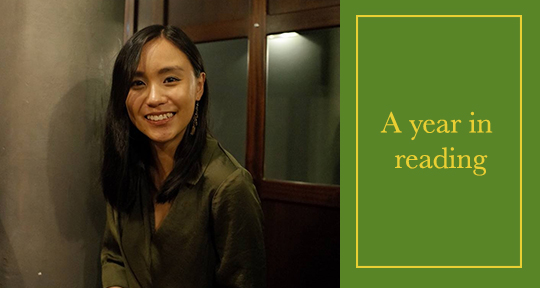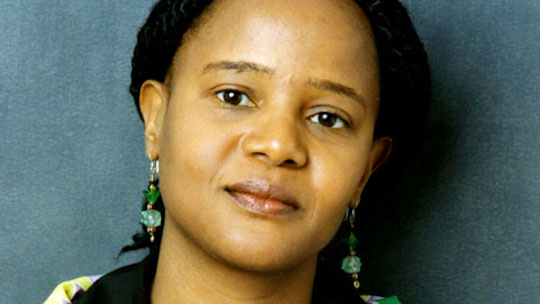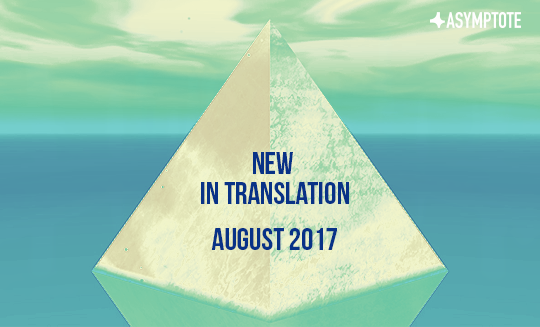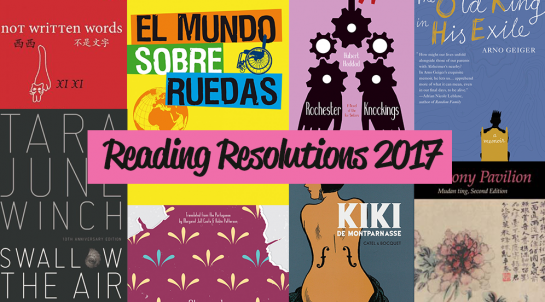“But why do you want to go to Haiti?” they asked her in Santo Domingo. “You crazy?”
She only smiled like a naïve foreigner, mumbled something about a sociolinguistic interest in the borderlands, and went out of the department with her Lotman under her arm. While she waited for the bus to the coach station she looked over the timetable that her classmates had reluctantly given her. It was going to take the whole day. The first thing she had to do was leave the city by the Carretera Sánchez.
“I’m only going as far as Barahona,” the driver warned her when he heard where she was going. “From there, you’re on your own.”
She didn’t mind. She sat on the left hand side so she could say goodbye to the sea; she fixed her eyes on the waves while the vehicle moved over the concrete. The blue was giving way little by little to green. When nothing but mountains was visible, she fell asleep. She woke up just in time to see the Arco del Triunfo.
She had a hard time finding someone to take her the rest of the way. Finally she ended up with a lorry driver whose job was to supply sugar cane to the city’s sugar factory. He was loading his vehicle with big water bottles.
“There’s not enough water over there,” he explained. “I’m going to make more on this trip than I make in a month going back and forth like crazy.”
They set off when the driver was sure that he’d made use of every cubic metre of his hold. They left the city behind and went into the sugar plantations. The lorry’s cabin shook with a wave of vituperation against the sugar industry. How they were worked from sun up to sun down. How bateyes still existed. How people were dying from machete wounds. How even after everything slavery still persisted, it’s just that now they called it minimum wage. Then the Laguna del Rincón appeared, and the criticism was directed towards uncontrolled fishing and the loss of heritage as a result of greed.
“They extract gypsum from that mountain,” he concluded signaling towards the other side. “Don’t get me started on the mines.”
She didn’t. She wasn’t about to get involved in ethical debates with a man who was trying to sell water at the price of mercury to the victims of an earthquake. Besides, enough people had confided in her their misfortunes for her to know that all of Latin America was singing from the same song sheet: each country had its own versions of the same general ills.
They stopped in Duvergé for something to eat: rice and pigeon peas. As soon as their plates were clean her companion stood up.
“We’ve got to get to Jimaní before nightfall: it’ll be hard to find somewhere to spend the night.”
They could barely make out the city when it became clear that something was out of the ordinairy. It was seething. For the second biggest cité in the municipalité, there were too many people. And people in the streets. They had to réduice their speed to avoid running someone over. They soon understood that they were principalment refugees. They stopped in front of a house d’aspect humble.
“They’re distant relatives” her guide excused himself. “Tomorrow you can go to the border. It’s only two kilometres away.”
She passéd the nuit on a pallet in the cuisine.
She sortied early, with only a piece of manioc in her estomac. She calculated that she’d have to marche for three quarts of an hour. The streets were as full as the précéding nuit. The soldats from the Fortaleza looked suspicieusely at the people going past. She commenced to move between the multitudes, parfaitly aware that she was swimming à countercurrent. Quand she left the last houses behind, the route became more sauvage. Elle décida to walk on one side so it would be more facile to mouve. Those who were coming in the opposée direction looked like they hadn’t eaten in days. They came with almost zéro, with seulely the robes they were wearing quand tout had se passé. On her right était the Étang Saumâtre, et elle imagina that if the dominicain gouvernment had not permetted the réfugiés to entrer, these waters would now be full de illegaux swimming pour their survie.
Elle could déjà see Mal Paso. Le nom was apt: négliged constructions that spat out misérables, infernal portes. She made her way à travers the réfugiés et entréed a totalement chaótique square. There were pleine de gens en the mouve, here et là camions could be seen, still trying to continuer with their commerce. Among them were the improviséd campements for those who still pensaient que they pourraient retourn. Elle parcrossed le perimetre lentement, completely submergéed. Vraiment Mallepasse. Elle vint more proche à la frontière. Un point de contrôle de Casques Bleus garded le passage.
“Eh! La fille!”, lui hurla l’un des soldats. “Tu peux pas passer! Rien que de l’aide internationale y peut traverser! C’est pas du tourisme, une catastrophe pareille!”
Elle resta immobile. De l’autre côté, elle vit l’Ayiti. Tout te sanble diferan de lót bò a.
–¿Pero por qué tú quieres ir a Haití? –le preguntaron en Santo Domingo–. ¿Estarás tú loca?
Ella sólo sonrió cual extranjera ingenua, balbució algo sobre el interés sociolingüístico de la frontera y salió de la facultad con su Lotman bajo el brazo. Mientras esperaba la guagua hacia la central de autobuses repasó el itinerario que a regañadientes le habían dado sus compañeros. Le iba a ocupar todo el día. Lo primero que tenía que hacer era salir de la ciudad por la Carretera Sánchez.
–Yo voy sólo hasta Barahona –le advirtió el conductor cuando se enteró de su destino–. A partir de ahí, se ampara sola.
No le importó. Se sentó del lado izquierdo para poder despedirse del mar; clavó los ojos en las olas mientras la máquina avanzaba por el concreto. El azul fue cediendo poco a poco al verde. Cuando no se distinguía más que monte, cayó dormida. Despertó justo a tiempo para ver el Arco del Triunfo.
Le costó trabajo encontrar quién la llevara el resto del camino. Finalmente dio con un camionero encargado de abastecer de caña al ingenio de la ciudad. Estaba cargando su vehículo con garrafones.
–Allá hace falta el agua –explicó–. Voy a hacer más con este viaje de lo que gano en un mes dando vueltas como loco.
Partieron cuando el conductor estuvo seguro de que cada metro cúbico de su caja estaba aprovechado. Dejaron detrás la ciudad y se adentraron en los cañaverales. La cabina del camión se removió con un vendaval de vituperios al sistema azucarero. Que se trabajaba de sol a sol. Que seguía existiendo la raya. Que la gente moría de una herida de machete. Que después de todo se mantenía la esclavitud, aunque ahora le dijeran salario mínimo. Entonces emergió la Laguna del Rincón, y la queja se dirigió hacia la pesca indiscriminada y la pérdida del patrimonio por culpa de la avaricia.
–De ese monte sacan yeso –concluyó señalando hacia el otro lado–. No me haga comenzar con las minas.
No lo hizo. No estaba para meterse en debates éticos con un hombre que pretendía venderles agua a precio de mercurio a los damnificados de un terremoto. Además, ya había protagonizado suficientes confidencias de desgracias como para saber que toda Latinoamérica cojea del mismo pie: cada país tiene sus propias versiones de los males generales.
Pararon en Duvergé por algo de comida: arroz con guandules. En cuanto limpiaron el plato su compañero se paró.
–Hay que llegar a Jimaní antes que anochezca: nos va a costar trabajo encontrar dónde pasar la noche.
Apenas divisaron la ciudad se dio cuenta de que algo había fuera de lo commún. Bullía. Para ser la segunda ciutat más grande del municipio, le sobraba gent. Y gent en las calles. Tuvieron que diminuir la velocidad para evitar atropellar a alguien. Pronto comprendió que se trataba en su majoría de refugiados. Se detuvieron frente a una casa d’aspecto humilde.
–Son parientes lejanos –se excusó su guía–. Mañana tú podrás ir a la frontera. Está apenas a dos kilómetros.
Passó la noche en un catre en la cuisina.
Sortió temprano, sólo con un trozo de yuca en el ventre. Calculaba que devía marchar tres quartos de hora. Las calles estaban tan plenas como la noche précédente. Los soldats de the Fortaleza miraban méfiantes las gens que pasaban. Commenzó a moverse entre la multitude, parfaitamente consciente de que nadaba à contrecorriente. Quand dejó atrás las últimas casas, el chemino se devenió más agreste. Décidió andar par un lado, de sorte que le fuera más fácile déplazarse. Los que veníaent en sens contrairio paraîcían no aver mangiado en varios días. Veníaent casi sans nada, seul con las robes que portaban quand tout se avía passado. À su derecha étaiba el Étang Saumâtre, et se immaginó que si el gouverno dominicain no hubiera permis la entrée de refugiés, esas aguas serían ahora pleines de illegaux nageando pour la supervivencia.
Elle veía déjà Mal Paso. Lui iba bien el nom: unos bâtiments négligéados qui escupían misérables, unas portes al enfer. Se ouvrió paso à travers de los réfugiés et entró en une plaza totalement chaótique. Étaiba pleine de gens en mouvemiento, aquí et là se apréciaban los camions que avían todavía essayé continuer con el commerce. Entre eux étaiban les campaments improvisés de los que pensaient todavía que pourraient retournar. Parcourrió le pérímétre lentement, duramente impressionée. Vraiment Mallepasse. Elle vint más proche à la frontière. Un point de contrôle de Casques Bleus vigilait le passage.
«Eh! La fille!», lui hurla l’un des soldats. «Tu peux pas passer! Rien que de l’aide internationale y peut traverser! C’est pas du tourisme, une catastrophe pareille!»
Elle resta immobile. De l’autre côté, elle vit l’Ayiti. Tout te sanble diferan de lót bò a.

